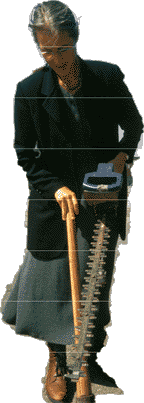 You Can't Get There From Here
You Can't Get There From Here Her response was typical. Most people think that if you can shoehorn a wheelchair into a space, whether by means of a rickety ramp or by hauling the chair up a flight of stairs manually, that you've covered your Americans With Disabilities Act bases and can slap a little wheelchair stick figure on the poster and be done with it. Most people think all disabled people use wheelchairs. Most people think if someone who does use a wheelchair attends an event, then that event must an accessible event because, after all, someone in a wheelchair was there.
I opened my newspaper this week and found to my disappointment that several of the Arts Festival events are being held in theater spaces which I know to be completely inaccessible. The Arts Festival receives public money and, of course, would like to receive more. The Berkeley Free Folk Festival was held for the last four years in an inaccessible venue, and when last year that venue's governing board refused to host this year's festival because of accessibility issues, the director moved the event-- to another inaccessible venue.
I've tried contacting members of the City Council, the City Manager, the Commission on Disabilities, the Arts Commission, the festival directors. I've done copious research on alternative, fully accessible locations, which become more numerous every year thanks to the hard-working people who make continuous efforts to bring existing venues into compliance. It would cost nothing to relocate events to places which the whole of the Berkeley community could attend together safely, as is required by both California and federal law.
But somehow, despite Berkeley's professed philosophy of inclusion and anti-discrimination, the systematic discrimination against the disabled continues. Those who raise the moral issue on the basis of justice, or the practical issue of hoping the city would have an interest in avoiding lawsuits, are dismissed or discredited as cranks, or worse, as anti-arts. Somehow in this strange and wonderful city with so many Ph.D.'s and so much higher consciousness, the equal rights of taxpayers with disabilities are considered too superficial to matter. Somehow in Berkeley, perhaps due to a political myopia which is its own serious disability, you can't get there from here.
*(the festival's director was a woman named Jessica Bryant)

The Berkeley "Free" Folk Festival held most recently in November had workshops in a room completely inaccessible to people who use wheelchairs. One wheelchair user was told the area, an area obviously listed on fliers as the location for some of the workshops, was "off limits".
Don't tell me to call the Mayor, who forwarded last year's letter of concern about the previous festival's violations to the City Manager. Don't tell me to call the City Manager, who conferred with the City Attorney, who sent a response courteously outlining a circuitous chain of logic in which the City of Berkeley magically emerges without responsibility or, more to the point, liability, despite the fact that the festival's budget includes public money and is officially sponsored by the City of Berkeley.
Don't tell me to call the Disability Compliance Officer, who once told me that it wasn't his job to help the City of Berkeley avoid lawsuits and signed off on the use of the most recent inaccessible venue. Don't tell me to talk to the Commission on Disabilities, who with a few honorable exceptions voted not only to allow the festival to be held in the problematic private venue but signed off on allowing public money to be used to "enhance" the accessibility slightly without requiring even matching funds.
Don't tell me to talk to the festival directors, who insist that any effort to talk about or improve the festival's access is an effort to "destroy" it. Don't tell me to speak with the "festival advisors" who refuse to meet or return phone calls and disparage anyone who raises the issue. Don't tell me to talk to the other musicians, who are content to sing about justice but get uncomfortable when asked to actually do anything practical to help with the problem.
Don't tell me to call the NEA site evaluator, who gave a glowing review to the first festival which featured an inaccessible entrance, an inaccessible exit, inaccessible bathrooms, inaccessible workshop rooms, blocked aisles, and an inaccessible stage.
Don't tell me to call the festival sponsor, who never returns my calls although she is a city councilmember who uses a wheelchair.
Don't fall for the fallacy that the accessibility problems would have been resolved years ago if those who raised the issue "hadn't pushed so hard" or had been "less aggressive." I've learned that no matter how softly you speak, how politely you inquire, how thoroughly you document your concern, if you raise the subject of disabled access people will perceive you as shouting. I've learned that once you're perceived in this way, the anger directed toward you will be perceived by others as "a feud" justifying their apathy. I've learned that five long years of dogged effort to create a festival which all members of the public can attend together without jeopardizing their health and safety is clearly not long enough.